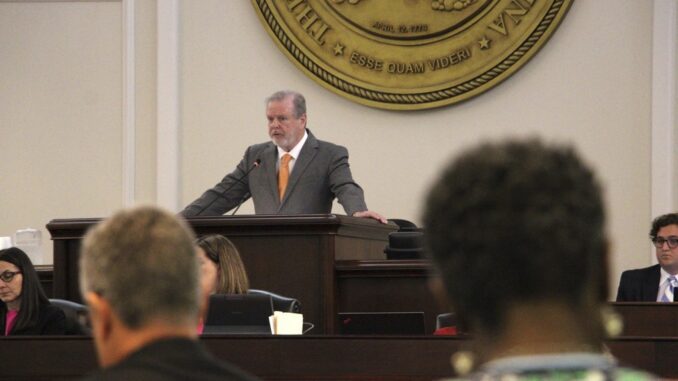
RALEIGH — The stage is set for a veto override fight following the passage of Senate Bill 20, the Care for Women, Children, and Families Act.
The legislation reduces the state’s elective abortion limit from 20 weeks down to 12 and includes an exception for rape and incest through 20 weeks. It also establishes an exception for fetal life-limiting anomalies through 24 weeks and there is no limit if a doctor determines the life of the mother is in danger.
Also included in the bill are several financial line items to support women and families, such as $75 million to expand access to child care, more than $16 million that includes federal matching funds to reduce infant and maternal mortality, and $20 million to pay for maternity and paternity leave for teachers and state employees.
Additionally, the bill includes almost $59 million for foster care, kinship care and children’s homes, as well as $7 million to increase birth control access for uninsured or medically indigent patients, and another $3 million to help mothers and fathers complete community college.
Multiple criminal penalties are also in the bill, including making it a Class D felony and a $250,000 fine for any physician that fails to aid babies born alive following a botched procedure, raising penalties for assault on pregnant women, including lifetime GPS monitoring for certain domestic violence offenders.
The bill passed the House on May 3 down party lines by a vote of 71-46.
On May 4, the Senate took up the bill, which passed by a vote of 29 to 20, again down party lines.
The Senate session began at 10 a.m. with more than half a dozen bills on the list. Discussion on Senate Bill 20 began just before noon, but the final vote was not taken until 4:58 p.m. due to every Senate Democrat taking a turn to speak. Each used the maximum 10-minute allotment to delay passage of the bill.
After passage and ratification that same day, the bill was sent to the governor.
Within hours of the bill passing, Cooper issued a video statement on Twitter accompanied by text that read. “This bill has nothing to do with making women safer, and everything to do with banning their reproductive freedom.”
In the video, Cooper claims “Republicans are pushing an abortion ban that dramatically reduces women’s health care freedoms.”
Cooper says the “fine print” will “shut down clinics” and make abortion “completely unavailable to many women.”
Throughout the video, the governor continually calls the change in the number of weeks a “ban,” however, the word ban does not appear in the bill’s text.
He also claimed that for a medication abortion, the bill “specifically limits it to 10 weeks,” yet no such language is in the bill. For medical abortions, including the use of abortion-inducing drugs, the bill says “voluntary and informed consent” is required “at least 72 hours” before the procedure is performed.
Near the end of his tweeted video statement, Cooper says “I will veto this awful bill, but I need your help.”
The “help” the governor refers to is that of pressuring four legislators he called out by name in the video as well as in a second tweet.
Cooper singled out Sen. Michael Lee (R-New Hanover) and Reps. Ted Davis (R-New Hanover), John Bradford (R-Mecklenburg) and Tricia Cotham (R-Mecklenburg), and directed the public to “demand they keep their promises.”
“They made campaign promises to protect women’s reproductive health,” Cooper said of the four legislators. “Demand that they keep their promises by sustaining the veto.”
Lee fired back at the governor in several tweets.
“I will not let the Governor lie to the people of my district and this state and try to bully me out of legislation I campaigned on supporting. I was clear on my position then, and I am clear now,” tweeted Lee in response. “I support 1st trimester abortions with exceptions beyond the first 12 weeks. That is exactly what this bill does.”
Lee also included a link to an article he wrote last September that refutes Cooper’s claims about Lee’s position.
“The vast majority of this state and country also believe that this is a common sense and reasonable approach,” Lee wrote.
Lee’s claim of support is partially backed by a recent poll by Carolina Partnership for Reform showing 56% of voters, including 51% of Unaffiliated voters and 42% of Democrats, support a 12-week limit on elective abortion with the same exceptions as the current law.
Bradford also pushed back on Cooper’s rhetoric.
“I am serving my 4th term in the legislature and the Governor wouldn’t know me if he bumped into me,” Bradford said in a statement to media outlet WSOC-TV. “In March he hosted a Down syndrome advocacy event and despite being the leading advocate for Down syndrome in the state legislature I was excluded.”
Bradford also cites being the primary bill sponsor of an organ donor transplant discrimination bill and that Cooper had invited a Democrat instead of him to the public bill signing as well as a personal letter he sent to Cooper in 2017 regarding I-77 toll lane safety issues.
“In 2017, I sent him a personal letter and a box of I-77 toll lane markers that were coming loose and causing safety issues. I asked him to honor his campaign promise to cancel the I-77 toll roads,” Bradford said. “He ignored my letter and request.”
“It’s ironic that Cooper acts like he knows me, wants to work with me or is even talking about honoring campaign promises,” Bradford said.
Davis and Cotham have yet to issue any formal statements.
Cotham is the only one of the four who had previously made statements in line with Cooper’s claims. In an April 2022 candidate survey, Cotham said that “North Carolina should act now to codify Roe v. Wade to affirm the right to an abortion without interference.”
During her previous service in the House, she had made statements supporting abortion rights, including a 2015 session debate on extending waiting periods to 72 hours in which she recounted undergoing an abortion procedure out of medical necessity.
Cooper spent time on various talk shows following passage of the bill and tweeted a video of himself being interviewed on CNN on the bill.
“North Carolina Republicans are pushing an extreme abortion ban that will cause many clinics to shut their doors and dramatically reduce women’s health care freedom,” the governor’s tweet reads.
Sen. Vicki Sawyer (R-Iredell) responded to the governor, tweeting, “So the politician who said that our kids can’t go to school, our businesses can’t open and everyone must be vaccinated in order to work is now saying that politicians shouldn’t be in healthcare.”
The governor appeared on CBS’s “Face The Nation” on May 7 and was asked by the host how he was going to “stop them” given that Republicans can override his veto given that they hold supermajorities in both chambers.
Cooper responded by blaming “gerrymandered districts” as the reason Republicans hold supermajorities, yet did not mention, nor was he asked, about the recent defection from his party, Rep. Tricia Cotham of Mecklenburg County.
During the interview, Cooper invoked the “four Republicans” again but did not name them as he had previously. He also repeated his claim that the bill will “effectively ban many abortions altogether because of the obstacles that they have created for women, for clinics and for doctors.”




